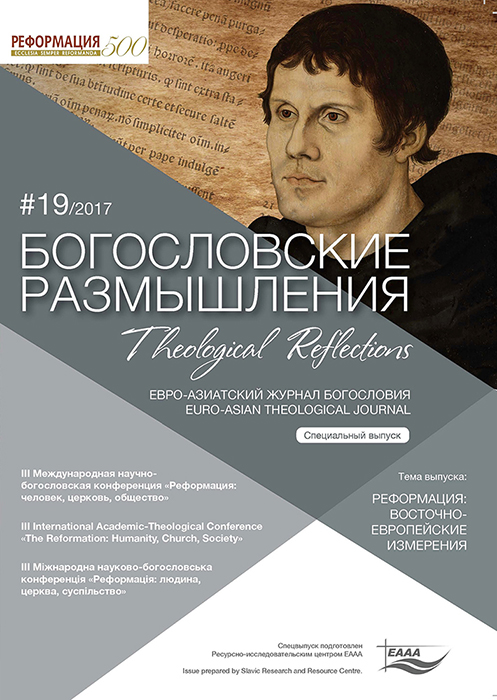Reformation and the apocalypse of secularism
DOI:
https://doi.org/10.29357/issn.2521-179X.2017.19.13Keywords:
Reformation, Secularity, Church, Protestantism, Theology, Society, Apocalypse.Abstract
The article is devoted to the conceptualization of Reformation and secularism in their correlation. The emphasis is made not as much on the historical or theological reading of the post-reform history of the secular world, but more so on the metahistorical and apocalyptic. A distinction is made between the secular apocalypse and the apocalypse of secularism. Secular apocalypse can be understood as the revelation of a person about himself, a revelation of suicide and dystopia. The apocalypse of secularism sets a very wide framework, returns secularity to the history of God’s revelation, in which there is a place for both death and resurrection. The author comes to the conclusion that secularism was a necessary, although a transitional stage in the history of relations between church and society; and in this sense, it can be referred to as the “unintended Reformation,” which for Christians appeared to be not as much as an elaborate plan but as an amazing revelation.References
- REFERENCES
- Bonhoffer, Ditrich. Etika. – Мoskva: Izdatel’stvo BBI, 2013.
- Gaїdenko, Piama. Vremia. Dlitel’nost’. Vechnost’. Problema vremeni v evrope ĭskoĭ filosofii i nauke. – Мoskva: ProgressTraditsiia, 2006.
- Ioakhim Florskii. Soglasovanie Vetkhogo i Novogo Zavetov // Antologiia srednevekovoĭ mysli v dvukh tomakh. Т. 1. – SanktPeterburg: RCHI, 2001.
- Nouwen, Henri. V radost’ obrati moĭ plach. – Кiev: Nard, 2013.
- Taylor, Charles. Sekuliarna doba. – Кyiv: Dukh i Litera, 2013.
- Jüngel, Eberhard. O smerti zhyvogo Boga (bogoslovskiĭ etjud) // Sravnitel’noe bogoslovie: nemetskiĭ protestantism. Teksty s kommentariiami. – Мoskva: Izdatel’stvo PSTGU, 2009. – С. 512-537.
- Gregory, Brad S. The Unintended Reformation. How a religious revolution secularized society. Cambridge: Belknap Press of Harvard University, 2012.
- Joustra, Robert, and Wilkinson, Alyssa. How to survive apocalypse. Grand Rapids: Eerdmans, 2016.
- Radner, Ephraim. The Reformation wrongly blamed // First Things, 2012.
- https://www.firstthings.com/article/2012/06/thereformationwronglyblamed.
- СПИСОК ЛИТЕРАТУРЫ
- Бонхеффер, Дитрих. Этика. – Москва: Издательство ББИ, 2013.
- Гайденко, Пиама. Время. Длительность. Вечность. Проблема времени в европейской философии и науке. – Москва: Прогресс-Традиция, 2006.
- Иоахим Флорский. Согласование Ветхого и Нового Заветов // Антология средневековой мысли. Теология и философия европейского средневековья в двух томах. Т. 1. – Санкт-Петербург: РХГИ, 2001.
- Нувен, Генри. В радость обрати мой плач. Через трудные времена – с надеждой. – Киев: Нард, 2013.
- Тейлор, Чарльз. Секулярна доба. – Київ: Дух і Літера, 2013.
- Юнгель, Эберхард. О смерти живого Бога (богословский этюд) // Сравнительное богословие: немецкий протестантизм XX века. Тексты с комментариями. – Москва: Издательство ПСТГУ, 2009. – С. 512-537.
- Gregory, Brad S. The Unintended Reformation. How a religious revolution secularized society. Cambridge: Belknap Press of Harvard University, 2012.
- Joustra, Robert, and Wilkinson, Alyssa. How to survive apocalypse. Grand Rapids: Eerdmans, 2016.
- Radner, Ephraim. The Reformation wrongly blamed // First Things, 2012.
- https://www.firstthings.com/article/2012/06/the-reformation-wrongly-blamed.
Downloads
Published
How to Cite
Issue
Section
License
Copyright (c) 2020 Mykhailo Cherenkov

This work is licensed under a Creative Commons Attribution-NonCommercial 4.0 International License.
All articles published in the Journal are distributed under a Creative Commons Attribution-NonCommercial 4.0 International License
By submitting an article for publication in Theological Reflections: Eastern European Journal of Theology the author grants the editors the right to publish the article and distribute it in electronic and print form.
The author reserves all copyrights and the right to use the materials of the article in whole or in part for educational purposes, to write his own dissertations, to prepare abstracts, conference reports, oral presentations, etc., as well as post electronic copies of articles (including the final electronic version downloaded from the journal’s official website) on non-commercial web-resources without the consent of the editorial board and founders.



